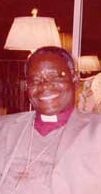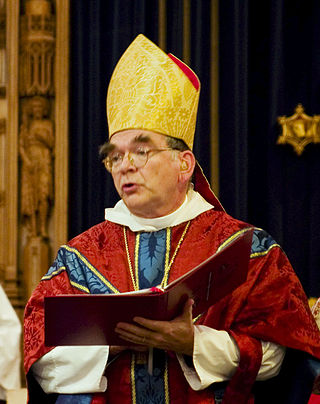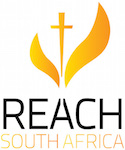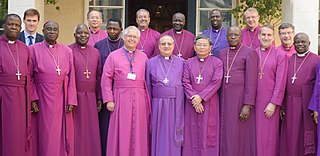Related Research Articles

The Anglican Communion is the third largest Christian communion after the Roman Catholic and Eastern Orthodox churches. Founded in 1867 in London, the communion has more than 85 million members within the Church of England and other autocephalous national and regional churches in full communion. The traditional origins of Anglican doctrine are summarised in the Thirty-nine Articles (1571). The archbishop of Canterbury in England acts as a focus of unity, recognised as primus inter pares, but does not exercise authority in Anglican provinces outside of the Church of England. Most, but not all, member churches of the communion are the historic national or regional Anglican churches.
Full communion is a communion or relationship of full agreement among different Christian denominations or Christian individuals that share certain essential principles of Christian theology. Views vary among denominations on exactly what constitutes full communion, but typically when two or more denominations are in full communion it enables services and celebrations, such as the Eucharist, to be shared among congregants or clergy of any of them with the full approval of each.

The Free Church of England (FCE) is an episcopal church based in England. The church was founded when a number of congregations separated from the established Church of England in the middle of the 19th century.

Peter Jasper Akinola is the former Anglican Primate of the Church of Nigeria. He is also the former bishop of Abuja and Archbishop of Province III, which covered the northern and central parts of the country. When the division into ecclesiastical provinces was adopted in 2002, he became the first Archbishop of Abuja Province, a position he held until 2010. He is married and a father of six.
The Continuing Anglican movement, also known as the Anglican Continuum, encompasses a number of Christian churches, principally based in North America, that have an Anglican identity and tradition but are not part of the Anglican Communion.

John Robert Walmsley Stott was an English Anglican cleric and theologian who was noted as a leader of the worldwide evangelical movement. He was one of the principal authors of the Lausanne Covenant in 1974. In 2005, Time magazine ranked Stott among the 100 most influential people in the world.

The Evangelical Lutheran Church in Canada is Canada's largest Lutheran denomination, with 95,000 baptized members in 519 congregations, with the second largest, the Lutheran Church–Canada, having 53,165 baptized members. Together with the LCC and the Canadian Association of Lutheran Congregations, it is one of only three all-Canadian Lutheran denominations. It is a member of the Lutheran World Federation, the Canadian Council of Churches, the World Council of Churches, and the Anglican-Lutheran North American grouping Churches Beyond Borders. According to the 2011 Canadian census, a larger number of 478,185 adherents identify as Lutheran.

The Anglican Church of Canada is the province of the Anglican Communion in Canada. The official French-language name is l'Église anglicane du Canada. In 2017, the Anglican Church counted 359,030 members on parish rolls in 2,206 congregations, organized into 1,571 parishes. The 2011 Canadian census counted 1,631,845 self-identified Anglicans, making the Anglican Church the third-largest Canadian church after the Catholic Church and the United Church of Canada. The 2021 Canadian census counted more than 1 million self-identified Anglicans, remaining the third-largest Canadian church.
The Anglican–Roman Catholic International Commission (ARCIC) is an organization created in 1969 which seeks to make ecumenical progress between the Anglican–Catholic dialogue. The sponsors are the Anglican Consultative Council and the Pontifical Council for Promoting Christian Unity.

The Anglican Communion Primates' Meetings are regular meetings of the primates in the Anglican Communion, i.e. the principal archbishops or bishops of each ecclesiastical province of the Anglican Communion. There are currently 38 primates of the Anglican Communion. The primates come together from the geographic provinces around the world for discussion and consultation. As primus inter pares of the communion, the Archbishop of Canterbury chairs the meetings, with the Secretary General of the Anglican Consultative Council (ACC) serving as secretary.

Robert William Duncan is an American Anglican bishop. He was the first primate and archbishop of the Anglican Church in North America (ACNA) from June 2009 to June 2014. In 1997, he was elected bishop of the Episcopal Diocese of Pittsburgh. In 2008, a majority of the diocesan convention voted to leave the diocese and the Episcopal Church and, in October 2009, named their new church the Anglican Diocese of Pittsburgh. Duncan served as bishop for the new Anglican diocese until 10 September 2016 upon the installation of his successor, Jim Hobby.

The Reformed Evangelical Anglican Church of South Africa (REACH-SA), known until 2013 as the Church of England in South Africa (CESA), is a Christian denomination in South Africa. It was constituted in 1938 as a federation of churches. It appointed its first bishop in 1955. It is an Anglican church and it relates closely to the Sydney Diocese of the Anglican Church of Australia, to which it is similar in that it sees itself as a bastion of the Reformation and particularly of reformed doctrine.
The September 14-16, 1977 Congress of St. Louis was an international gathering of nearly 2,000 Anglicans in St. Louis, Missouri, united in their rejection of theological changes introduced by the Anglican Church of Canada and by the Episcopal Church in the United States of America in its General Convention of 1976. Anglicans who attended this congress felt that these changes amounted to foundational alterations in the American and Canadian provinces of the Anglican Communion and meant that they had "departed from Christ's One, Holy, Catholic and Apostolic Church." Theological liberalism, revisions to the Book of Common Prayer, and the ordination of women priests were not the only reasons for the split, but they were seen by these churches as evidence of the mainline church's departure from Anglican orthodoxy. The idea for a congress originated with the Reverend Canon Albert J. duBois in 1973 in preparation for the Louisville General Convention of the Episcopal Church. This congress was sponsored by the Fellowship of Concerned Churchmen, an organization founded in 1973 as a coordinating agent for laypeople and clergy concerned about the breakdown of faith and order within the Episcopal Church and the Anglican Church of Canada.
The Convergence Movement, also known as the Ancient-Future Faith movement, is a Protestant Christian movement that began during the Fourth Great Awakening (1960–1980) in the United States.

The Global South Fellowship of Anglican Churches (GSFA), formerly known as Global South (Anglican), is a communion of 25 Anglican churches, of which 22 are provinces of the Anglican Communion, plus the Anglican Church in North America and the Anglican Church in Brazil. The Anglican Diocese of Sydney is also officially listed as a member.
The historic or historical episcopate comprises all episcopates, that is, it is the collective body of all the bishops of a group who are in valid apostolic succession. This succession is transmitted from each bishop to their successors by the rite of Holy Orders. It is sometimes subject of episcopal genealogy.
The Global Anglican Future Conference (GAFCON) is a series of conferences of conservative Anglican bishops and leaders, the first of which was held in Jerusalem from 22 to 29 June 2008 to address the growing controversy of the divisions in the Anglican Communion, the rise of secularism, as well as concerns with HIV/AIDS and poverty. As a result of the conference, the Jerusalem Declaration was issued and the Global Fellowship of Confessing Anglicans was created. The conference participants also called for the creation of the Anglican Church in North America as an alternative to both the Episcopal Church in the United States and the Anglican Church of Canada, and declared that recognition by the Archbishop of Canterbury is not necessary to Anglican identity.
The Global Fellowship of Confessing Anglicans is a communion of conservative Anglican churches that formed in 2008 in response to ongoing theological disputes in the worldwide Anglican Communion. Conservative Anglicans met in 2008 at the Global Anglican Future Conference, creating the Jerusalem Declaration and establishing the Fellowship of Confessing Anglicans (FCA), which was rebranded as GAFCON in 2017.
The Parish Communion movement is a movement in the Church of England which aims to make Parish Communion on a Sunday the main act of worship in a parish.
John Hewitt Rodgers Jr. (1930–2022) was an American Anglican theologian and bishop. The author of multiple commentaries on the Thirty-Nine Articles of Religion, he was a founding faculty member at Trinity School for Ministry and served as its dean and president from 1978 to 1990. In 2000, he played a role in the global Anglican realignment when he was consecrated as a bishop of the Anglican Church of Rwanda to oversee congregations in North America through the Anglican Mission in America.
References
- ↑ Atherstone, Andrew (November 2011). "The Keele Congress of 1967: A Paradigm Shift in Anglican Evangelical Attitudes". Journal of Anglican Studies. 9 (2): 175–197. doi:10.1017/S1740355311000039. ISSN 1745-5278. S2CID 145320306.
- ↑ "Evangelicals exit their ghetto". www.churchtimes.co.uk. Retrieved 2023-05-31.
- ↑ Crowe, Philip; University of Keele, eds. (1967). Keele '67: the National Evangelical Anglican Congress statement. Falcon books. London: [Church Pastoral-Aid Society.
- ↑ "The Nottingham Statement". www.romans45.org. Retrieved 2023-05-31.
- ↑ Bunting, Ian. "Evangelical Anglican Way: Reacting, Reviving and Reforming 1828-1900".
{{cite journal}}: Cite journal requires|journal=(help) - ↑ Took, Christopher (September 21, 2003). "Archbishop of Canterbury greets delegates at NEAC4". Anglican Communion News Service.